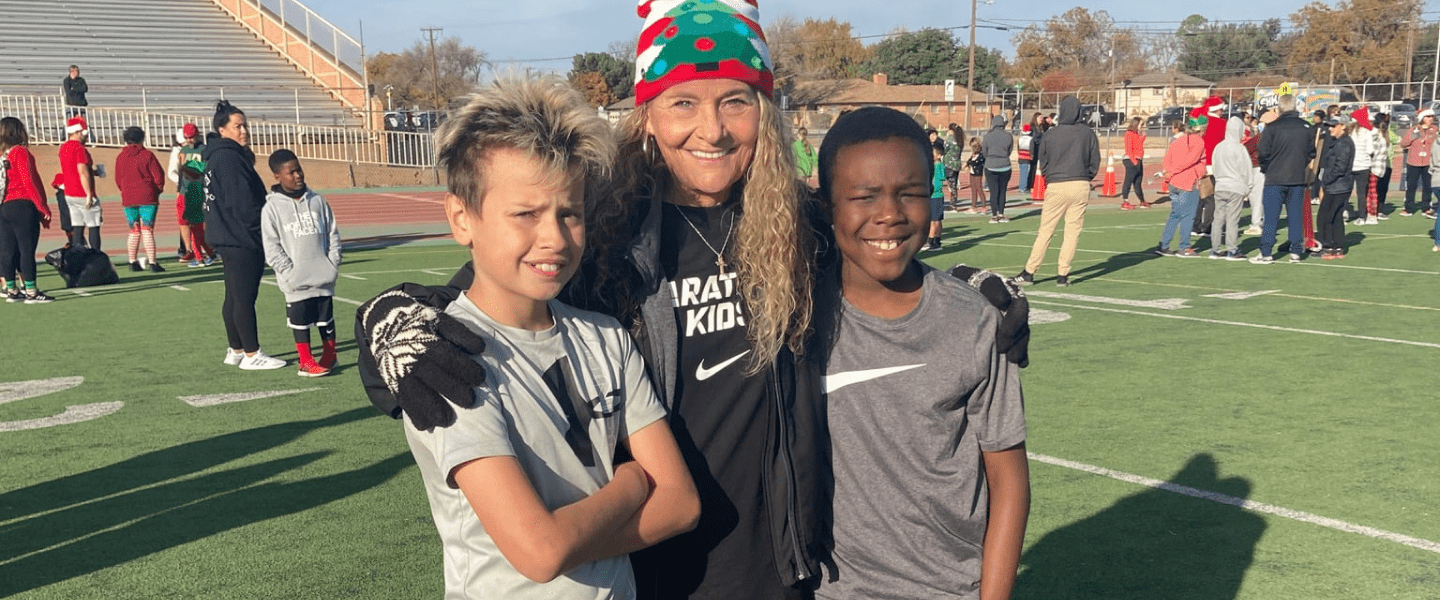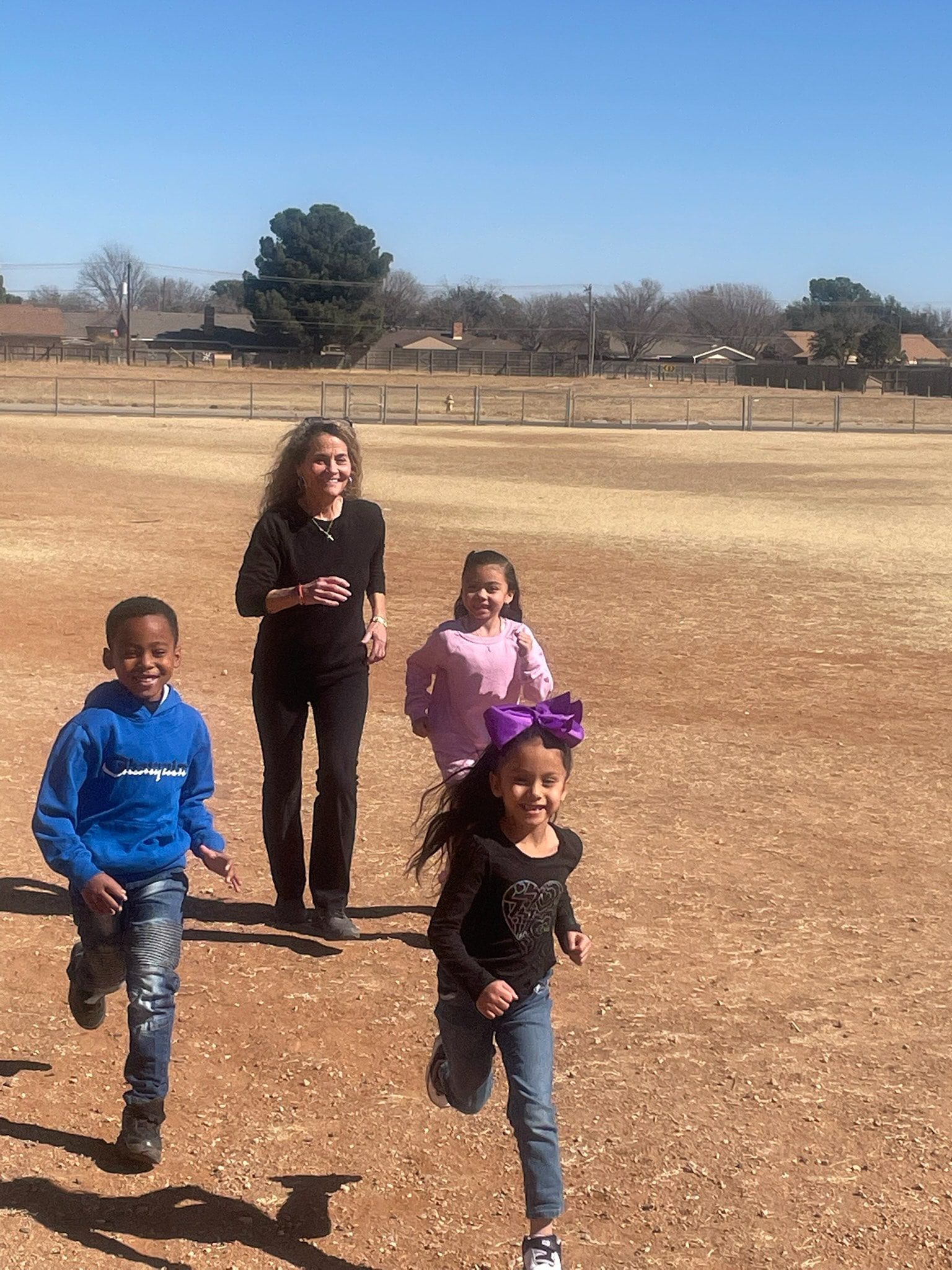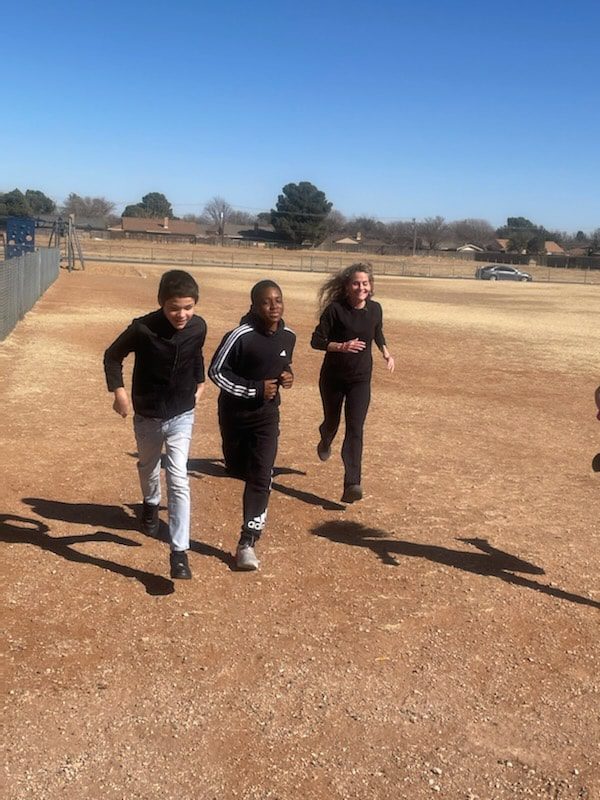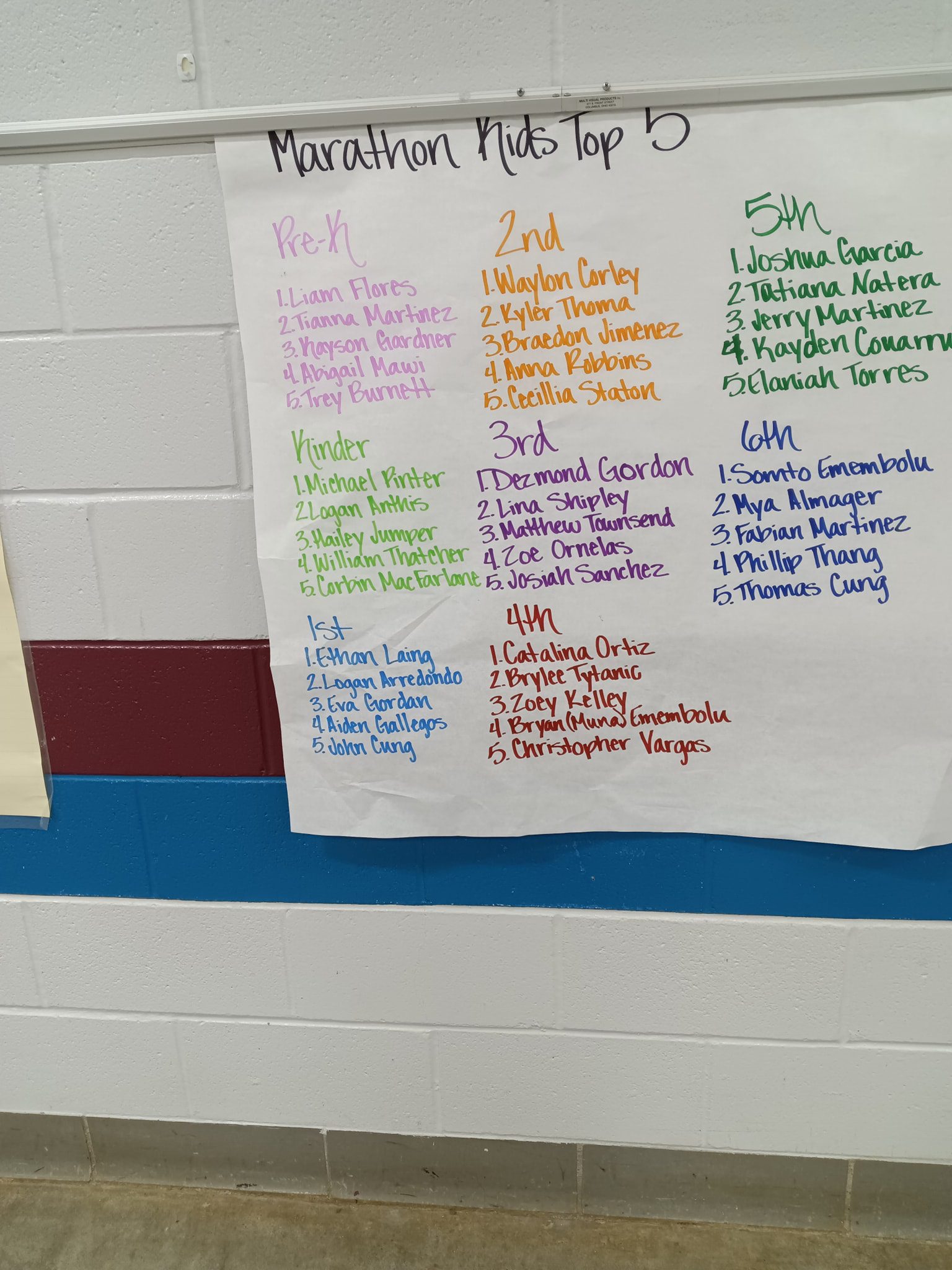
Bush Elementary Students Build Strength and Resilience with Marathon Kids
By Catherine Morris
Coach Terri Pitts has a mission statement posted prominently on the wall in her classroom at Bush Elementary School in Midland, Texas: “Develop confidence, skills and knowledge through fair play and respect.”
Her students worked together to compose the statement, which Pitts believes is part of its magic. “Since the students came up with it, they become stakeholders in their health and fitness. I am proud to say that when I ask them to run or do jumping jacks, push-ups and so on, I do not hear moans. That makes my heart happy.”
Pitts has taught health and PE for over two decades, and she absolutely loves her job. She has also been a Marathon Kids coach since the organization was founded, over 25 years ago. “I was in a different school and city when I first started this excellent program,” she says, referring to Marathon Kids. “I wanted to continue it in my new school.”

She loves the program for lots of reasons, starting with the fact that it is free and user-friendly, with multiple ways to quickly and easily log students’ active time and track their progress. “Not only that,” she says, “parents can get involved and record activity minutes that are done in the evening, on weekends and on holidays.”
This is one way in which Marathon Kids involves not just the participating students, but the whole community. “I have found that if parents get involved, it gets the whole family moving,” Pitts says. “I love this! Students are loving this! Parents are loving this! We are currently working on a school community garden, and it takes a whole community to synergize to make that happen. We are forming a healthy school community and getting more involvement.”
For those reasons along with the health benefits that Marathon Kids offers, Pitts says, “I keep coming back every year.”
Marathon Kids Helps Students Learn Why and How to Live Healthy Lives
The majority of Bush Elementary students are Hispanic, and over half come from low-income families. “They have a wonderful attitude about exercising,” Coach Pitts says of her students. “They know the reasons we exercise and the benefits that come from it. They know that attitude makes a world of difference.”
Pitts is grateful to have students who are so engaged and determined. “It was not always that way,” she says. She’s had classes in the past that groaned when she gave them their physical activity assignments for the day.
“But that is when a foundation has to be set,” she reasons. “The students need to know why we exercise, and how to balance food intake with exercise. Also, the coach needs to set an example of doing physical activity and making healthy choices when consuming food and drinks. Once the students know why, they will set goals for themselves to make themselves healthier for life.”
The Marathon Kids program emphasizes both the power of goal-setting for students to take their health into their own hands, and the importance of adults modeling healthy choices for children. Both methods are proven to help kids build a foundation for a lifetime of physical activity and good health.
“The students need to know why we exercise. Also, the coach needs to set an example of doing physical activity. Once the students know why, they will set goals for themselves to be healthier for life.”
Daily Physical Activity Helps Kids Meet Challenges and Build Resilience
Along with the mission statement in her classroom, Pitts also has a poster in the gym that reminds students that “Health Is Wealth”—a philosophy she truly believes and models for her students every day. “There are so many benefits of being physically active,” she says. “Regular physical activity is proven to help prevent and manage non-communicable diseases such as diabetes, heart disease, strokes and cancer. Additionally, it helps prevent hypertension. It helps individuals maintain healthy body weight. It can improve mental health, quality of life and overall well-being.”
Marathon Kids was founded on similar values. The research-based program was designed to help combat the youth inactivity crisis while showing kids that being physically active every day improves their entire well-being. This is something Coach Pitts sees in her classroom every day.
“Our school mascot is the Challengers,” says Coach Pitts. “We accept the challenge in anything that comes our way. Our community is very strong. Parents are very supportive, and so is the school staff.”
Her students do Marathon Kids during PE and also at recess. “My classes are intense,” she says, “with cardio activities one after the other. Recess is 20 minutes, and very fast-paced. The students have a huge recess bucket filled with tons of activities, plus a wonderful playground and field. I have never seen anybody sitting around during recess.”

Sometimes Pitts scans her students’ ID cards to log their distances, but since her classes involve all sorts of activities besides running and walking, she often enters their active time in minutes instead. The Marathon Kids program equates 20 minutes of heart-pumping activity to one mile of running or walking.
It’s easy for coaches as well as teachers and parents to use the cloud-based digital platform to log active time that students complete off the track or outside of PE class. “If parents log in and add miles at home,” Pitts says, “that gives students more miles. According to our stats on the Marathon Kids dashboard, our students’ combined average is 32,792 minutes weekly.”
That weekly distance is equal to over 1,600 miles covered by Bush Elementary students—more than 62 marathons weekly! It’s easy to see why Coach Pitt’s students are in a dead heat with students at another Midland ISD school—Yarbrough Elementary—to be the #1 Marathon Kids school in the country.
Finding Creative Ways to Keep Kids Motivated
“I am always looking for effective ways to motivate my students to set and reach the fitness goals they have set for themselves,” Coach Pitts says. “This in turn will set an excellent foundation for them to be healthy and active adults.”
Part of her approach to setting that all-important foundation is asking students to notice how they feel after being physically active. “Most will realize that they are less stressed and feel great,” Pitts says. “They realize they are ready for the rest of the day! This alone is great motivation.”
She recalls one student in particular, who was having a hard time in school and a tough time emotionally. “He would cry every day,” she says. “He came to my class and learned about Marathon Kids. He started becoming very active, and he realized he felt better.”
Now, she says, that same student regularly asks, “‘Are we going to run the track today?’ That is his favorite thing to do. I love that! He is now one of our better students, ready to learn and always happy to come to school.”

Pitts likes to post photos of students in the gym who have shown great improvement in their attitudes or running skills over time. She also posts photos of the top runners in each grade to help the students stay motivated to keep pushing toward their goals. “The students love to see their photos on the wall,” she says.
She also finds the Marathon Kids reports to be a great source of both data and motivation. “One report I use quite a bit is the grade level mileage report. The students are motivated by a board I put up in the gym with the top five mileage runners in each grade level. I put the top mileage runners up every two weeks. They know at the end of the school year, the top five from each grade level will be invited to a fun party in the gym. This has been a great motivational tool.”
In general, Pitts says, the Marathon Kids program is “a wonderful motivational tool. It motivates the students to set goals for themself and to be the best they can be.”
Make Marathon Kids Your School's Running Partner